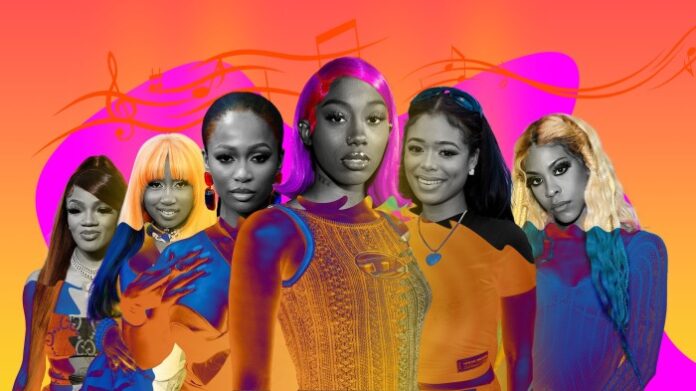Controversy creates cash. It’s an adage as old as public relations. So when North Carolina rapper DaBaby wanted to maximize attention for his latest album, Baby on Baby 2, he went straight for the lowest-hanging fruit: riling up the internet.
His method? The song “Boogeyman,” in which he claims to have had sex with rapper Megan Thee Stallion the day before she was shot, allegedly by rapper Tory Lanez, in 2020. The stunt worked, to an extent, as DaBaby’s name was the No. 1 trending topic on Twitter. But that didn’t translate to success for the album — Baby on Baby 2 sold a paltry 16,000 copies in its first week. The album’s poor showing led fans and some of DaBaby’s peers, such as Meek Mill, to speculate that the low sales numbers were due to a “cancel culture” backlash over his anti-gay outbursts last year. The answer, however, is much simpler: DaBaby just isn’t making good music.
DaBaby, born Jonathan Kirk, blew up on the national scene in 2019 with his first album, Baby On Baby. The project would eventually make it as high as No. 7 on the Billboard 200, powered by the platinum single “Suge.” DaBaby would carry the popularity through the year, endearing himself to both male and female fans with his happy-go-lucky nature, fun videos, and a unique rhyme flow that rumbled against the beat like a pair of sneakers in the dryer. Later in 2019, he’d drop Kirk, a chart-topping album with two more platinum singles, “Intro” and “Bop.” DaBaby accomplished the rare feat of being both the Rookie of the Year and the MVP of 2019.
That momentum carried into 2020 with another No. 1 album, Blame It on Baby. Slowly, though, the cracks in DaBaby’s musical output started to show. It became clear that the rapper lacked any malleability with his flow, rapping the same way on every beat. For instance, at the end of 2019, he struggled through a Sway in the Morning freestyle over a slower “Guilty Conscience” beat. The video would be roundly ridiculed on social media. His songs would have the same problem. Each new track, including his EP, My Brother’s Keeper (Long Live G), felt increasingly redundant and failed to capture the magic of that initial pre-pandemic run.
Then the you-know-what hit the fan. During last summer’s Rolling Loud festival, DaBaby took a break between songs to offer this brief commentary:
“If you didn’t show up today with HIV, AIDS, or any of them deadly sexually transmitted diseases that’ll make you die in two to three weeks, then put your cellphone lighter up. Fellas, if you ain’t sucking d— in the parking lot, put your cellphone lighter up.”
The comments were vile, inaccurately condemning those with HIV to death while also spouting vitriol at gay men. Fans and celebrities such as British singer Elton John, writer George M. Johnson, and collaborator Dua Lipa spoke out against the rapper’s anti-gay bias.
DaBaby responded with more vitriol, arguing that his gay fans don’t have HIV or AIDS because they’re not “nasty” or “junkies.” He released a video called Giving What it’s Supposed to Give, where he held up a sign that said “AIDS,” and a closing message that read, “Don’t Fight Hate With Hate. My apologies for being me the same way you want the freedom to be you.” DaBaby would post an apology, the contents of which he’s since deleted.
Festivals such as Lollapalooza canceled his performances. And as the removals increased, DaBaby would become the poster child for “cancel culture” — the idea that society has changed to the point that people can’t express themselves freely, resulting in damaged careers and, eventually, silence. Comedian Dave Chappelle, who has come under fire for his own anti-gay and anti-trans content, used DaBaby as a focal point of a joke about how offending the LGBT community carries more punishment than violence against Black people. In it, he referred to a 2018 incident in which DaBaby shot and killed a Black man in what he said was self-defense, and didn’t face jail time.
As the criticism increased, DaBaby only became more dedicated to being his most toxic self. He posted multiple videos on Instagram kicking the mother of his child out of their house and yelling insults at her. A video surfaced of him and his cronies reportedly jumping her brother at a bowling alley. And he maintained an adversarial relationship with Megan Thee Stallion that seemed to come out of nowhere. DaBaby brought out Tory Lanez, who has been accused of shooting Megan Thee Stallion, to perform with him at that same Rolling Loud show where he made his anti-gay comments.
In short, DaBaby was doing his career no favors.
This fact hasn’t stopped the conspiracy theories about why his album flopped. Rappers such as Meek Mill and Boosie — the latter has his own laundry list of anti-gay statements — both spoke out about DaBaby’s numbers, hinting at a conspiracy to quell his success, even though the album was prominently featured on Apple Music and Spotify. DaBaby said his sales weren’t bad for someone who was being “blackballed.” But the insinuation was clear: DaBaby was a victim of the LGBT community and its “power” to get rid of celebrities. This presumes the LGBT community maintains an outsize level of dominance that supersedes those of any other group, allowing them to wield that power to quell any voices that dare offend them. That stereotype is not only disingenuous, it also ignores an important fact about DaBaby’s fall from grace: He just isn’t making good music lately.
Baby on Baby 2 continues DaBaby’s trend of refusing to switch his style, flow or song structure. In it, he’s rapping over the same kinds of beats with longtime collaborator JetsonMade, and tossing out the same delivery and hooks. “Socks,” for example, is as lackadaisical as anything in his catalog. “Act That Hard” sounds like it could have come out in 2020, and may be what DaBaby still sounds like in 2025.
Additionally, his attempts to drag Megan Thee Stallion, one of the biggest names in rap, into his publicity for the album reeked of desperation, which made fans recoil even more. Even before the album dropped, DaBaby had to cancel a concert in New Orleans because of low ticket sales.
If the history of music and entertainment has taught us one thing, it’s that quality output supersedes almost any offense, and even some crimes, especially if those crimes are against the people society doesn’t care about. Just look at the illustrious career of R. Kelly, who was recently convicted on child pornography charges, or the fact Kodak Black, who has a long criminal record, recently performed at the BET Hip-Hop Awards.
I mean, just look at Lanez.
Lanez has been the center of controversy ever since Megan Thee Stallion accused him of shooting her in August 2020. He’s spent most of his time since the incident antagonizing her, spreading misogyny and insults, all while court cases in the shooting, one for assault with a firearm and another for carrying an unregistered firearm, are pending. And yet, Lanez’s popularity hasn’t waned. His most recent album, Sorry 4 What, even got a social media co-sign from Los Angeles Lakers star LeBron James.
There are two reasons for Lanez’s sustained popularity: One, there’s a desire among some, especially men like Lanez and his fans, to see women humbled. But even that wouldn’t save his career if he weren’t widely regarded as a talented musician — Lanez has written hits for acts such as Fifth Harmony and G-Eazy and is able to churn out a versatile array of popular songs. He has talent that DaBaby hasn’t shown himself to possess.
Cancel culture is a myth that attempts to paint those who seek to harm marginalized people as the victims. But nobody really gets canceled by having their careers ended by offending the LGBT community, the Black community, or any other group that has to fight for equality. Find a celebrity who claims to have been canceled and you’ll also see a celebrity who is still raking in money. Sure, DaBaby endured short-term career setbacks when some of his festival appearances were pulled, but his album was still prominently featured on streaming service home pages. He is still on tour. He will be able to make a living as a musician for years to come, even if he never reaches the popularity he hit in 2020. If he were putting out better music, he’d be riding the wave of fandom to the same chart-topping success he enjoyed when he was the hot new act in hip-hop. Tory Lanez and the endless list of abusers, anti-gay people and racists whose careers continue to flourish indicates that these offenses alone don’t end careers.
DaBaby’s floundering career has nothing to do with his anti-gay bias. After all, Chappelle is as famous as ever. Boosie still does interviews and goes viral when he wants. Comedian Kevin Hart, who stepped down as host of the Academy Awards in 2018 over his past anti-gay tweets, is on a huge comedy tour. DaBaby could also enjoy a continued ultrasuccessful career while being part of the ever-growing anti-LGBT fraternity if he were pumping out any content people wanted to enjoy. Instead, he’s just making bad music. Even if DaBaby had not made that outburst at Rolling Loud, his career would be on the same trajectory it’s on now: a downward spiral of a two-year supernova who couldn’t sustain his own greatness because his music simply wasn’t good enough.








